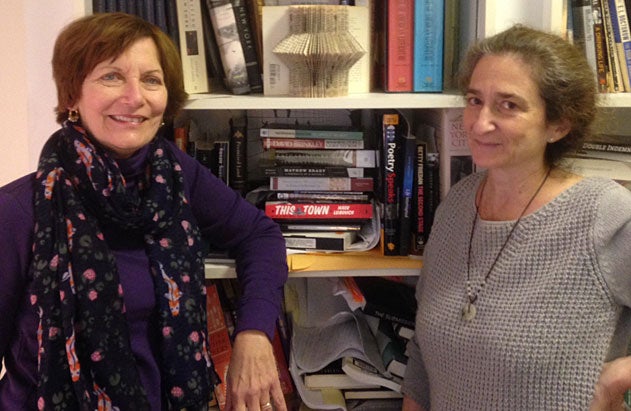Title: Politics and Prose: New Course Looks at Washington, D.C.
Washington Confidential, a new Georgetown course, explores how District of Columbia politics is depicted in novels, journalism and film.

NOVEMBER 4, 2014HOW POLITICS IN THEDistrict of Columbia is depicted in novels, journalism and film is the subject of Washington Confidential, a new Georgetown course co-taught by NPR’s book critic and a ghostwriter/researcher for prominent city movers and shakers.
“I’ve learned how little Washington is represented in novels, poetry and film unless the subject is politics or politicians,” says Joanie Greve (C’15), a student in the class. “Very little has been written about the life of the city itself, partly because of how hard many writers have found the task.”
The faculty members teaching the course are steeped in all things Washington.
Maureen Corrigan, critic-in-residence for Georgetown College’s English department is book critic on the Peabody Award-winning NPR program, “Fresh Air,” and also serves as Mystery Columnist forThe Washington Post.
Barbara Feinman Todd, who now directs Georgetown’s journalism program, served as ghostwriter and “book doctor” on Hillary Clinton’sIt Takes A Villageand other memoirs, and as researcher on Ben Bradlee’sA Good Life,Bob Woodward’sVEILand Carl Bernstein’sLoyalties: A Son’s Memoir.
‘OTHER WASHINGTONS’
Students in the class watch films and read a wide range of works, fromDemocracyby Henry Adams to Thomas Mallon’s recent novel,Watergate,to Washington Post Publisher Katharine Graham’sPersonal Historyand Edward Jones’Lost in the Cityand other material.
Films include the classic 1976 Watergate filmAll the President’s Menand 1939’sMr. Smith Goes to Washington.
“I wanted to introduce students to other versions of Washington, the less obvious ones,” says Feinman Todd.“I’ve lived and worked here for three decades and I’m still figuring out how things work – who is really doing what behind the scenes, the stuff you can’t Google,that doesn’t have a paper or electronic trail– that’s what interests me.
“That’s the book about Washington I want to write,” she adds. “As I try to convey my take on this town to the students it’s helping me work it out in my head. And getting to do this alongside Maureen? Priceless.”
Greve says she’s enjoyed required reading that explores ‘other Washingtons,’ such as the one depicted in George P. Pelecanos’ novelHard Revolution, which describes neighborhoods affected by the 1968 race riots.
“I think Professor Todd and Professor Corrigan work so well together as a teaching team because they’ve had very different yet complementary experiences of Washington,” Greve adds. “They’ve each lived this city with one foot in journalism and one in academics, and it gives them a rounded and balanced perspective on everything we learn.”
WORLDS-WITHIN-WORLDS
Feinman Todd says she and Corrigan, who are good friends, have wanted to co-teach a course for quite some time.
“Barbara knows more about the craft of journalism and the worlds-within-worlds of Washington than Julia Child knew about cooking and James Joyce knew about Dublin,” says Corrigan, the recent author of So We Read On, How the Great Gatsby Came to be and Why It Endures(Little, Brown and Company, 2014).“I also thought the class would be a wonderful complement to my New York Stories course – I love to investigate how cities are defined, in part, by the narratives they inspire.”
In a recent class, Corrigan and Feinman Todd led a discussion of Mallon’s historical fibook of historical fiction, which focuses on characters less key to the Watergate scandal, such as the wives of some of the president’s operatives and Fred LaRue, deputy director of the Committee to Re-Elect the President, a.k.a. CREEP.
“Even as somebody who, young as I was when I lived through this era – I couldn’t remember who Fred LaRue was,” Corrigan noted in class. “Part of what Mallon is doing here is decentering the narrative.”
She said the authorWatergateappears to be employing a literary theory known as New Historicism, in which writers attempt to “take away from the official narrative history,” and also sometimes “tell it from the bottom up.”
GUEST SPEAKERS
Mallon is scheduled to visit the class on Nov. 13.
Other upcoming guest speakers include Natalie Hopkinson, author ofGo-Go Live: The Musical Life and Death of a Chocolate Cityon the Go-Go musical scene in Washington, D.C., and Georgetown’s Dinaw Mengestu (C’00), Lannan Foundation Chair in Poetics and the author ofThe Beautiful Things That Heaven Bears,a novel about immigrants in the city, among other novels.
Past speakers include Ted Gup, author ofThe Book of Honor: Covert Lives and Classified Deaths at the CIA, on secrecy in Washington, D.C., and Evelyn Small, book researcher and editor for Graham’s memoir.
MOVING PARTS
Greves, who hopes to become a journalist after graduation, interned with TIMEmagazine in New York City this past summer.
She says the class has given her a new appreciation for Washington, D.C., history a better understanding of the city’s moving parts.
“When I see Washington on MSNBC, it becomes easy to think of the city as just these talking heads and the politicians they rip apart or interview, or both simultaneously,” she adds. “But there are many other people here, many other experiences and many other workers that go into making this city run. Reading some of their stories and perspectives has reminded me of their importance here.”